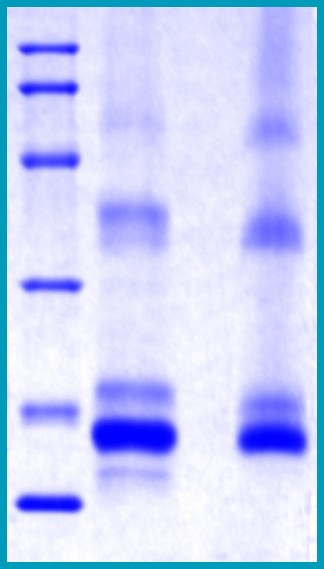Type
Recombinant protein
Description
Total 165 AA. MW: 17.8 kDa (calculated). UniProtKB acc.no. P12936 (Ala2-Ala154). N-terminal His-tag (12 extra AA). Protein identity confirmed by MS.
Amino Acid Sequence
MRGSHHHHHHGSAARVCCQLDPARDVLCLRPVGAESRGRPVSGPFGTLPSPSSSAVPADHGAHLSLRGLPVCAFSSAGPCALRFTSARRMETTVNAHQVLPKVLHKRTLGLSAMSTTDLEAYFKDCLFKDWEELGEEIRLKVFVLGGCRHKLVCSPAPCNFFTSA
Source
E. coli
Purity
˃ 90 % by SDS-PAGE
SDS-PAGE Gel
14% SDS-PAGE separation of HBx
1. M.W. marker – 14, 21, 31, 45, 66, 97 kDa
2. reduced and heated sample, 2.5μg/lane
3. non-reduced and non-heated sample, 2.5μg/lane
Endotoxin
< 1.0 EU/µg
Formulation
Filtered (0.4 μm) and lyophilized from 0.5 mg/ml solution in 50 mM acetate buffer, pH=4.0 + 5% (w/v) trehalose
Reconstitution
Add 0.1 M acetate buffer pH 4.0 to prepare a working stock solution of approximately 0.5 mg/ml and let the lyophilized pellet dissolve completely.
Applications
Western blotting, ELISA
Shipping
At ambient temperature. Upon receipt, store the product at the temperature recommended below.
Storage/Expiration
Store lyophilized protein at -80°C. Lyophilized protein remains stable until the expiry date when stored at -80°C. Aliquot reconstituted protein to avoid repeated freezing/thawing cycles and store at -80°C for long term storage. Reconstituted protein can be stored at 4°C for a week.
Quality Control Test
BCA to determine quantity of the protein.
SDS PAGE to determine purity of the protein.
Endotoxin level determination.
Note
This product is intended for research use only.

